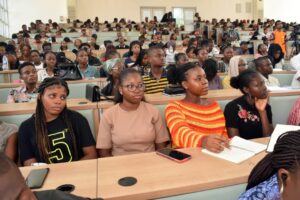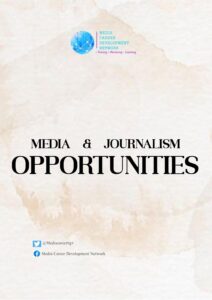Writer and Life Coach, Jewel Onyeneke reports on the review and tips for improved investigative reporting of COVID-19 during a recent webinar by the Global Investigative Journalists Network (GIJN)
Following the outbreak of COVID-19, there have been various training to assess and improve on the reporting of the disease and impact globally. A webinar was recently held by the Global Investigative Journalism Network (GIJN) which is the largest global network of non-profit investigative journalism organizations with 187 member organizations in 78 countries.
The webinar which focused on Africa was the 8th edition and was tagged “Investigating the Pandemic: the Threat to Africa”. The session was moderated by Asha Mwilu, an investigative journalist with Citizen TV in Nairobi, Kenya and had four experienced panellists including Dayo Aiyetan of International Centre for Investigative Reporting in Nigeria, Mia Malan of Bhekisisa Centre for Health Journalism (South Africa), Dr. Peter Mwesige of African Centre for Media Excellence (Uganda) and Joshua Olufemi of Dataphyte (Nigeria).
The speakers reviewed the coverage of the COVID-19 so far and shared tips and tools to help journalists investigate important stories and perspectives on coronavirus as the number of infected persons continues to rise in the continent.
With the population of about 1.1 billion people, the complexities of the region’s health care systems and diverse demographic pose a special challenge from medical readiness, response to crunching data and finding how money is being used.
Giving his impression about coverage of Covid-19 in Nigeria and across the region, Aiyetan stated that Nigerian journalists and other African journalists have done incredibly well in covering the pandemic and all related issues, notwithstanding that the crisis caught everyone unawares worldwide. He pointed out that the communication strategy adopted by the Nigerian government to provide daily updates for the public about the current situation through the Presidential Task Force was informed by an early signal sent by journalists.
READ ALSO: 7 Ways journalists can maintain mental and emotional wellbeing
He cited an example when the impression given to the public and World Health Organization by the Minister of Health and Minister of Humanitarian Affairs at a press conference that Nigeria was ready to combat COVID-19 was debunked through evidence-based investigative journalism.
Media reports, he said, was able to show that the government’s claim that it was ready for the pandemic was not true, but rather overstated considering the fact that as at then, even the Federal Capital Territory had only one Isolation centre. He said that reports by journalists influenced the decision to increase the allowances of health workers like that of their counterparts in other countries, curbed the overzealousness of security operatives enforcing the lockdown and as well focused on cases of domestic violence due to the lockdown.
On what obtains in South Africa, Malan acknowledged that the Government had a dramatically different response to the CCOVID-19 pandemic compared to what happened in the late 90s and early 2000 when HIV ravaged the country. According to her, the then-president Thabo Mbeki questioned the fact that HIV was the cause of AIDS and that resulted in government policies that denied thousands of South Africans access to HIV treatment for years. She said the media in South Africa commended the government because it came up with an evidence-based COVID-19 policy which was based on science and lessons learnt from other countries, coupled with a high level of transparency.
With reports being released daily by scientists and number of tests being presented on national television, Malan acknowledged that the government and the media have been on the same page, except that the media have continued to question the long period of lockdown which has inflicted a lot of sufferings on the citizens with not enough explanation given.
In his assessment, Dr Mwesige said from what he has been able to see in the East Africa region, the media have covered lots of information about the basics of the disease, including the spread of the virus, the prevention measures, the impact and others. He, however, thinks that the media have not been able to do enough of setting agenda for rigorous debate on some issues, noting that the official claims should be better interrogated.
“We have not seen much investigation quite frankly and I think in March when most of Africa was reporting their first confirmed cases, there also appeared to be some kind of fear from the media to report critically on the dark spots of COVID-19”.
He said misleading information on social media have not been debunked as quickly as they should.
On his part, Olufemi said stories that have fascinated him are those written about human right issues and issues of livelihood across the country. He acknowledged that for the first time, he saw journalists and even civil societies trying to use a bit of data tools such as visualizations to counter-narrative or better tell the story in a more fascinating way.
Regrettably, however, he said there have been not enough stories about vulnerable people or about people with disabilities, citing the case of people living with HIV/AIDS and people that need regular attention within the health sector.
According to him, the media tends to see less of such stories, but he believes that more can be done in this regards. Without disputing the fact that debunking of misinformation is important like Mwesige pointed out, Olufemi, however, said that it will be necessary to have more human angle stories, just like the one a reporter did which quickly responded to the human rights violation by Nigerian security operatives.
According to him, another interesting trend he found fascinating was the use of data to predict health and other issues in the country such as predicting confirmed cases of COVID-19 and how many ventilators was actually bought in 2019 to respond to any other respiratory kind of challenges in the country. He, therefore, advised that journalists should begin to review more policies in the continent in order to do comparative analysis and track spending on different issues.
To ensure accurate reporting of the science of coronavirus, Malan advised that journalists without science background should always phone a scientist, use a verified website, use PubMed and question a preprint study’s result to be sure of what they are reporting because giving out wrong or unverified information can lead to death. She referred to the case in the United States of America when President Donald Trump encouraged the use of Chloroquine as a cure for COVID-19.
According to her, the difference between reporting an outbreak such as COVID-19 and general government corruption is that if the media get the facts wrong, it can literary lead to deaths and the promotion of unproven cure, even if the intention is good, can be very dangerous.
She further advised journalists to scrutinize government policies, investigate difficult to understand COVID-19 strategies, scrutinize unproven treatments, and investigate the social consequences, collaborate with others and write stories in a way that it will attract people to want to read it.
As part of her tips on how to make stories attractive, she said journalists should always try to find a concrete example that makes it easier to understand the consequences of different scientific approaches, do a long-form narrative feature, do the same story in a different format and collaborate instead of replicating and combine the science with a strong narrative.
On how to use available data for advocacy and ensure accountability, Olufemi said journalists can use data to monitor economic trends, human right violations, track donations and aids, budget allocation and spending and procurement, noting that there are organisations like his which can support the media with the necessary information for their reporting.
Olufemi pointed out composition, location, distribution, relationship, comparison as the basic elements that can help get good results from data. He also listed web scrapper, beautiful soup, Outwit PDF converters, Wayback Machine, open file, Venngage, Flourish Inforgram, Datawrapper, Highcharts/Map Carto , Google MyMaps, Tableau. PowerBI, Qlik R, Python, and Excel as powerful free tools that one can use to aid investigative journalism.
Referring to the article “ Telling the story of COVID-19 in Africa: A basket of ideas” published his organization’s website Mwesige said that seeking public opinion is important regarding what kind of stories journalists can cover and asking questions to investigate all claims across the board. The story of COVID-19, he said must be as big an issue as other types of stories.
To effectively report the issues about the virus, like the core health, economic relief packages, human rights and misinformation, Aiyetan the old skills of investigative journalism and computer-assisted analysis will be helpful, considering the restriction of movements.
He noted that many of the materials or information needed to do our stories are available online on different websites. According to him, the usage of such information gave insight as to how Nigeria was fairing compared to other nations like Ghana.
He also said data should be put in context so that people can understand the reports.





